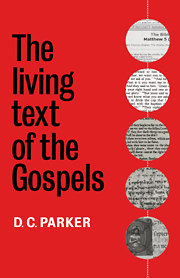Book contents
- Frontmatter
- Contents
- Preface
- List of abbreviations and frequently cited works
- 1 The theory
- 2 The materials
- 3 The practice
- 4 ‘As our Saviour taught us …’: the Lord's Prayer
- 5 The sayings on marriage and divorce
- 6 The story of the woman taken in adultery
- 7 Secrets and hypotheses
- 8 The endings of Mark's Gospel
- 9 The last three chapters of Luke
- 10 The development and transmission of the Fourth Gospel
- 11 From codex to disk
- 12 The living text
- Index of citations
- Index of Greek New Testament manuscripts
- Index of names and subjects
7 - Secrets and hypotheses
Published online by Cambridge University Press: 05 June 2012
- Frontmatter
- Contents
- Preface
- List of abbreviations and frequently cited works
- 1 The theory
- 2 The materials
- 3 The practice
- 4 ‘As our Saviour taught us …’: the Lord's Prayer
- 5 The sayings on marriage and divorce
- 6 The story of the woman taken in adultery
- 7 Secrets and hypotheses
- 8 The endings of Mark's Gospel
- 9 The last three chapters of Luke
- 10 The development and transmission of the Fourth Gospel
- 11 From codex to disk
- 12 The living text
- Index of citations
- Index of Greek New Testament manuscripts
- Index of names and subjects
Summary
It is still a current oddity that many a literary critic has investigated the past ownership and mechanical condition of his second-hand automobile, or the pedigree and training of his dog, more thoroughly than he has looked into the qualifications of the text on which his critical theories rest.
Fredson Bowers, Textual and Literary CriticismThe phrase ‘To you has been given the secret of the kingdom of God’ (Mark 4.11) has been one of the most significant for the twentieth-century study of Mark's Gospel, for two reasons. The one concerns its theological interpretation, the other its relationship to the Gospels of Matthew and Luke.
In his book The Messianic Secret, published in 1901, the German scholar William Wrede argued that the key theological theme in Mark's Gospel is what he called the Messianic Secret, the idea that Jesus kept his messiahship hidden. There was, he claimed, a very good historical reason for this: that the earliest Christians believed God to have made Jesus the Messiah only after the resurrection (see Acts 2.36). The idea that he had already been the Messiah during his ministry was a later development and, to explain why it had not always been known, Mark developed the idea of a Messianic Secret. Jesus had indeed always been the Messiah, but he had told his disciples that only after the resurrection were they to speak about it (Mark 8.30; 9.9).
- Type
- Chapter
- Information
- The Living Text of the Gospels , pp. 103 - 123Publisher: Cambridge University PressPrint publication year: 1997



